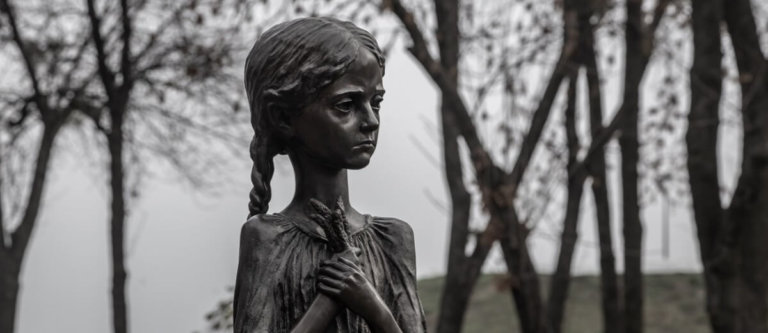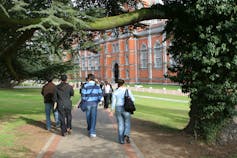
Recent events at the University of Alberta called into question expectations for those who teach in universities.
The university’s student journalism society, The Gateway, reported November 27 that an assistant lecturer, Dougal MacDonald, “made a Facebook post on November 20 … where he said the Holodomor is a ‘lie’ and perpetuated ‘myth’. The publication also captured screenshots of Facebook posts and published a statement from MacDonald.
The Holomodor — “death by hunger” in Ukrainian — refers to the death of millions of Ukrainians in 1932–33 due to Soviet policies under the Josef Stalin regime. Canada recognised the Holomodor as an act of genocide in 2008, as have the provinces of Saskatchewan, Manitoba, Alberta, Ontario, Québec and most recently British Columbia.
On December 6, the deans of arts and education at the university issued a statement saying MacDonald’s claim of the Holomodor as a myth “is not true. It is not a statement based on historical evidence.”
There was public outrage about the Facebook post by students and community groups, and a call for MacDonald’s dismissal.
Freedom of expression?
The Toronto Star reported that in an emailed statement, the University of Alberta said: “MacDonald had a right to express his opinion and said his views did not represent those of the university.”
Forty-three current and former faculty members from the University of Alberta signed a letter of support for MacDonald. They claim MacDonald’s views are protected by his rights to free speech and cited the University of Alberta’s new statement on freedom of expression.

Those teaching in publicly funded universities should be held accountable for denying historical and public-record facts, whether in their classrooms or beyond. Source: Shutterstock
Discussions about what university instructors or professors can say often invoke themes of freedom of expression or academic freedom as it pertains to both faculty or sessional lecturers. But what about their roles as teachers of undergraduate or graduate students in publicly funded institutions?
We are two educators at the University of Saskatchewan’s College of Education involved in researching teaching and learning. We have designed provincial educational curricula, hired and mentored faculty and lecturers, trained teachers and developed material for broadening cultural awareness.
We believe those teaching in publicly funded universities — whether tenured professors or contract lecturers — should be held accountable for denying historical and public-record facts, whether in their classrooms or beyond.
Denial of the public record
The denial of the Holodomor by MacDonald is reminiscent of the Holocaust denials of the late James Keegstra, an Alberta teacher who was charged with hate speech in 1984 and stripped of his teaching licence. His “conviction under Canada’s hate propaganda laws was upheld by the Supreme Court of Canada.”
In New Brunswick, teacher Malcolm Ross was removed from teaching due to his anti-Semitic behaviours. The Supreme Court ruled that “removal from his teaching position was necessary to ensure that no influence of this kind is exerted by him upon his students and to ensure that the educational services are discrimination‑free”.
The teaching profession, regulated provincially, has deliberated on the topic of freedom of expression and has responded accordingly with clear guidelines.
Teachers are provided with standards of conduct through their regulating bodies that act as guideposts for maintenance of a collective reputation in the public’s interests.
Publicly funded education

Publicly funded universities, like public schools, have a responsibility to inspire and uphold public trust. Source: Shutterstock
Such events are co-existing globally with a rise in fake news and ideological propaganda that discounts historical facts through social media, sometimes with terrible consequences.
Under public scrutiny
Clear parallels exist between how society regulates K-12 teachers and what it expects from them and the work of university instructors. For example, both those teaching children and young adults are implicitly role models for the next generation in all aspects of their growth.
Universities have an important role in providing places of thought, reflection and learning. The work of tenured professors and sessional instructors is governed by different collective agreements.
Regardless of the agreements that define their work and academic freedom, when they are teaching, these professors or lecturers become role models for their students in how to communicate knowledge.
They are also entrusted to instruct in service of the collective good of our societies, and this means their actions are under the scrutiny of many. From our point of view, they are in positions of public trust and visibility and are by default accountable at all times.
Proactive guidance
In our current political context, we are seeing advocacy for freedom of expression on campus, alongside a rise in polarised ideologies.
In a recent ruling, Alberta’s superior court said students have Charter-protected free expression rights on campus. If a university instructor is also a PhD student, what could this mean for university and instructional classroom leadership?
To deal with that potential conflict, universities, like the professional bodies that oversee teachers in public schools, may need to provide more proactive guidance for instructors. One way to do this could be through the university’s mission, vision or values and related standards of behaviour.
For example, a learning charter at the University of Saskatchewan outlines conduct for students, educators and other partners in higher education. Such a charter doesn’t offer cut-and-dried answers, but speaks in concrete terms to the important value of a university as a learning, as well as a research and inquiry milieu.
It will become increasingly important for universities to consider how their responsibilities as learning and educational institutions that foster public trust can be upheld. We cannot be complacent to fostering public denials of the historic record through silence or fear of reprisal because of freedom of expression.
By Jay Wilson, Associate Professor and Department Head, Curriculum Studies, College of Education, University of Saskatchewan and Nadia Prokopchuk, Instructor, College of Education, University of Saskatchewan
This article is republished from The Conversation under a Creative Commons license. Read the original article.
Liked this? Then you’ll love…
Is politics still interfering the teaching of history today?
Politics is choking Hong Kong universities’ academic freedom







